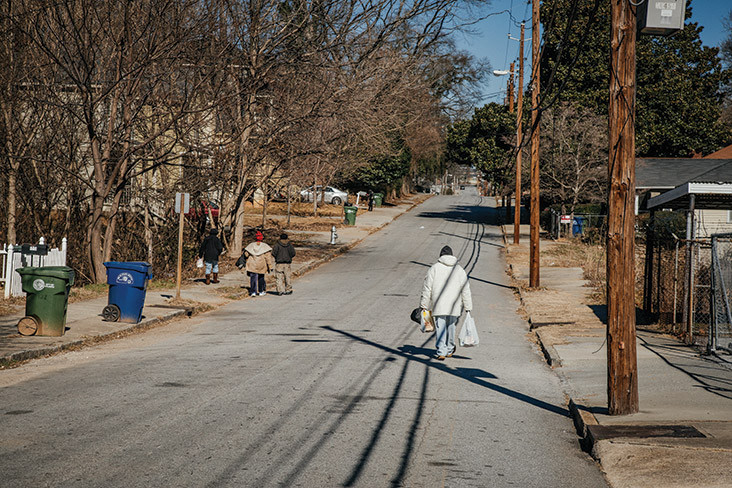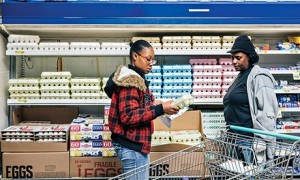
In a region that prides itself on celebrity chefs and lush farmers markets, half a million people live without access to something as basic as a grocery store
Excerpt:
Once a month, Emma and Charles Davis make their “big” grocery-shopping trip. It’s practically an all-day expedition: To travel the twelve miles from their apartment off Bolton Road to the Kroger on Moreland Avenue requires two MARTA transfers, and the journey begins and ends with a fifteen-minute trek between their front door and the bus stop. “The hardest part is all that walking,” said Charles, who suffers from arthritis. They pile their grocery bags in a wheeled basket, and the bus driver lowers the wheelchair ramp to help them board. But pushing the loaded cart gets tiring. “You just buy what you need, because you have to carry it all,” explained Charles.
If everything goes right—the buses are on time and they make every connection—a one-way trip from their apartment to the store takes two hours. But if there’s a glitch, and there’s almost always a glitch, they’re looking at three hours. Each way. By car it takes twenty minutes to cover the same route. There’s another Kroger, half the distance from the one on Moreland Avenue. But the bus to get there is crowded. “No one gives up a seat,” Charles said. “We have to stand the whole way.” Forget the store five miles north in Vinings Village; MARTA service ends at the border of Fulton and Cobb counties.
 When they need to restock between their monthly trips, the Davises venture to Super Giant Food on Donald Lee Hollowell Parkway, about three miles from their apartment. On weekdays, the trip to Super Giant takes three-quarters of an hour—thirty minutes of walking and fifteen on the bus. But on the weekend, MARTA schedules are reduced, which means waiting up to an hour for the bus.
When they need to restock between their monthly trips, the Davises venture to Super Giant Food on Donald Lee Hollowell Parkway, about three miles from their apartment. On weekdays, the trip to Super Giant takes three-quarters of an hour—thirty minutes of walking and fifteen on the bus. But on the weekend, MARTA schedules are reduced, which means waiting up to an hour for the bus.
I met the Davises one frigid morning in January as they left Super Giant Food. Charles wore jaunty alligator shoes and a heavy leather jacket decorated with patches, mementos from his Army years. Emma, bundled in a green jacket and a cozy fleece hat, pushed their wheeled basket to the curb. “The prices can be higher here than at Kroger—especially for meat,” said Charles, squinting down at the plastic bags bundled in Emma’s basket. “But it seems like everywhere is getting higher, just when everyone’s food stamps are getting cut.” Still, the couple, who are in their sixties, prefer Super Giant to the only close alternative: convenience stores. “The smaller corner stores nearby are a waste of time and money,” Charles said. They navigated the empty parking lot slowly, Emma clutching the handles of their wheeled cart and Charles leaning on his cane. They crossed the four lanes of Hollowell Parkway and then stood at the bus stop, waiting.
Inside Super Giant, owner Sam Goswami was overseeing the installation of a new produce case. An electrician was perched atop a ladder, the whirring of his drill blending with the gospel music that poured through the store’s sound system. The Super Giant is light and airy. It sparkles—quite literally—thanks to six-foot strips of mirror tile wrapped around the top of each pillar that supports its roof. The tiles cast disco-ball twinkles over the neatly stocked display shelves and wide aisles.
That seventies decorative touch was in place when Goswami bought Super Giant back in 2003. A hotelier who’d worked in San Francisco and then Hiawassee, Georgia, before moving to Gwinnett County, Goswami never planned to get into the grocery business, but was intrigued when the Super Giant came on the market. His friends and family, on the other hand, were skeptical. The store adjoined a onetime Kmart that housed a flea market, surrounded by six acres of asphalt in the epicenter of Bankhead, a west Atlanta neighborhood best known for blighted housing projects, sketchy auto parts shops, and a dance called the Bankhead Bounce.
But Goswami was undeterred, and over the past decade, a funny thing happened: He fell in love with Bankhead. When you’re in the hotel business, your customers come and go. As a grocer, you see the same people week after week, year after year. You watch them select ingredients for daily suppers, plan birthday celebrations, stretch their budgets during lean times, and try to follow the doctor’s orders and eat more vegetables.
